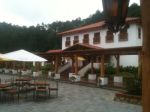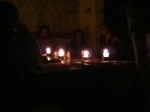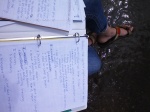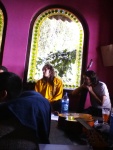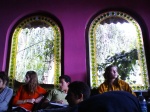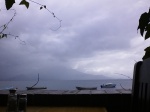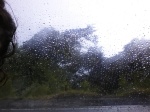Our trip from Guatemala (UFM), to Atitlan (Panajachel) took us about 3 hours. On our way to Atitlan some people were sleeping and others (like me) were looking at the countryside. My favorite part of this ride was when we passed besides Tecpan. Here I show some pictures of the type of houses that are built there.
I also had a long and amazing conversation with Ingrid about her life in Switzerland while she was a studying, then working, and then raising kids. I wanted to know more about the cantons and the political ways in which Switzerland works, because I had some heard that things were very different from what we have (the system) over there. She told me that there were 26 cantons in Switzerland, and everything started with just about 4 of them, but while other people joined them, Switzerland became bigger but kept the political organization of the cantons. About taxing, each Canton has different taxing percentages, Ingrid lived in Geneva, located near the Alps, and she told me that over there, the more you had, the more you paid. I don’t think this is a good intensive to increase the wealth of a nation, but the Swiss have done it, I yet don’t know how. Something very cool that happens in that country is that the ones who own the power and who order and really set things up is the people, the citizens. So, if someone in the country has a very cool plan to implement in the canton or in the country, this person needs to collect signatures, and take this with a letter to the government, and they send a poll to everyone in the canton and they vote about whether they want them or don’t. She also told me that for the elections, the poll goes by mail, so people receive it and sent I back with their votes. People can vote for a person, for a party or even for a plan of government. I find this pretty interesting. There is not really a president in Switzerland, because the assembly elects a representative for a period of six months only, and then changes it for a new one. Ingrid told me that she remembers an occasion when the representatives of each Canton wanted to get a salary increase, so they send the poll, `people voted no, and so the representatives didn’t get their rise. If people are paying taxes, at least they should be the ones deciding how the money should me spend through the government services and arcs.
We finally arrived to Pana, then we took a boat to the Iguana Perdida in Santa Cruz La Laguna, Atitlan.
Picture taken from: http://www.laiguanaperdida.com/
Oh, I forgot to mention that Bert gave us a portfolio with things that we were to be using during our trip. We had lunch in the iguana, I ordered a Gordito Lunch, or something of that kind, haha. Then, we had 3 hours to read the first part of the Benjamin Franklin’s autobiography (I’ll write more of this book in another post). Then, we had a comprehension test, to see how well we understood what we read. Bert asked us during the debrief what values and virtues did Benjamin mentioned that he learned. Some of them were: Humility, vanity (I don’t know if It is a virtue, but Franklin says that everyone has it), modesty, honesty and patience. Another very interesting thing is that Franklin educated himself sin he was about ten years old. This principle of self-education we are implementing here, in MPC, too.
Then, we had a delicious dinner, and afterwards I played darts with a guy and a girl from England that were also staying at the Iguana. I must say that I sucked at the beginning, but after playing for about half an hour I really improved a lot. I want to have darts in my house and maybe we can have them in our new MPC space, to untie our anger and rage haha. With this said and done, day one comes to an end.
Day two: We had our morning meeting where Bert gave each of us a paper with a question that we will have to answer and that will conform our MPC handbook. Mine was: What are the qualities that typify a program facilitator at MPC? First, I had no idea of what this question meant, but finally I discovered that facilitator was to be the “teacher”, which is not the same as I will try to explain in the next few days. We also discussed UFM’s mission statement: “The mission of Universidad Francisco Marroquín is to teach and disseminate the ethical, legal and economic principles of a society of free and responsible persons.” We discussed if UFM was really doing this, and whether the students were honoring this principles or just ignoring them? We had breakfast and afterwards we worked with our groups trying to brainstorm with ideas about the question we were given. Pablito, Grace and I agreed on spending from thirty to forty minutes to do this, and then share our ideas with the rest of the group. We did that, and Grace’s and Pablito’s question about liberty and the economic principles of a free society rang a bell in my head, so I wrote down something for pablito that I thought he should include in his essay, and gave it to him, and drew a sketch comparing soccer with freedom, competition and economics. I’ll post this picture in this post (The blue pen was the one i used). Grace and Pablito helped me a lot with my brainstorm, and even though I had a lot of stuff already, they found missing and important points that they told me and I add them to my brainstorm.
After doing this, we started working on our outlines, and then, we also shared them with the other members of my group. We had lunch, and then we had a lot of stuff to do on our plate: Finishing the outline, reading more of Benjamin Franklin, Document, Work on our individual rubric, Reading “The Role of the Liberal Arts in a College Education” and answering to the questions in the text, sharing our personal vision and our MPC vision statement, working on our MPC travel rubric, working on our small groups rubrics. We also discussed for a lot of time the issues we had with the food, because last week we agreed on having buffet for breakfast and dinner every day at the Iguana Perdida, but some people were not willing to have the buffet at the Iguana, so it was a big mess and disaster because of communication and organization issues. It’s about the commitment issues that many people here have. Something that I found very useful and necessary is giving feedback to people when feeling like it. Because I really felt relieve and much more relaxed with some anger and discontent that I was saving to myself with people from the MPC. I really think that doing this will detriment our culture and community because by not being real, everyone is going to grow resent towards each other. I shared this, of course and really hope that the MPCers take my advice. With the food problem, we made an agreement on being individually responsible of our food order, releasing Pablito and Bert from this responsibility.
We also read “The Role of the Liberal Arts in a College Education” that I think is chapter 2 from a book named “Orientation to College”. Some of the notes that I took while reading this and the questions that are written in the text that I answered are these:
“Liberal arts include: arts, humanities, mathematics and natural and physical social sciences.”
“Liberal arts provide the foundation for becoming educated. It also provides the theoretical basis for all practical or applied studies.”
I found the connection between an essay inside of this chapter named “The earthly use of a liberal education” by A. Bartlett Giamatti and the video of Fredy Kofman that we watched a month ago in MPC. The name of this essay also caught my attention because many people think that studying liberal arts is a waste of time and won’t give you money. But nothing is going to give people money, unless I look for it. As Ralph Waldo Emerson says: “that though the wide universe is full of good, no kernel of nourishing corn can come to him but through his toil bestowed on that plot of ground which is given to him to till.” We decide what we want in our life and a good start is the liberal arts because it promotes the lifelong love of learning. No one will ever know everything about the world, everyone in the world misses knowing something, the world is constantly changing and evolving, so the best education one can get is one that promotes a lifelong love of learning. Enjoying to read, enjoying to be informed, enjoying to have knowledge. As written in this essay, every program in the world shall help people to exercise and develop the power of the mind, and that the Liberal Arts and MPC does. It promotes the “learning for its own sake”. Some other important stuff I found in this essay are these: “Ideas and their pursuit define our humanity and make us human”, this makes me realize that everything we see, was created by someone, was in the beginning an idea, it’s amazing how we can CREATE stuff and how these creations and improvements define ourselves, our societies and the entire humanity. “Fulfilling your human capacities to reason and to imagine freely… [helps you to] express the results of your thinking in speech, and in writing with logic, clarity, and grace [rhetoric]. When one thinks clearly and understand their thoughts, one can communicate fluidly and clearly. This other quote I wrote down for the haters of the Liberal Arts: “Fear not, you will not be impeded from making a living because you have learned to think for yourself and because you take pleasure in the operation of the mind and in the pursuit of new ideas.” And then, Giamatti goes on saying that we are the ones responsible for making a living, no one ever is going to work for you or give your life meaning or employment. It also reminds me that one can lose every material thing in life, but never the knowledge gained and ideas. This other quote reminded me of John Locke: “we learn that there are limits to our freedom, limits we learn to choose freely”. Freedom has limits; we are free inside of the “limit box”. Then, Giamatti adds “We must learn good freedom depends for its existence upon freely chosen (because rationally understood) forms of order” The part of “Rationally understood” also reminds me of Fredy Koffman’s video, the last part where he talks about accepting a law, a freedom limit because we rationally understand it, and we are willingly accepting it. That’s what we shall do with every law, pity there are as many laws in Guatemala that nobody understands and hence, nobody puts to practice. Answer to the question for this essay: 1) In your own words, how would you explain the attitude of mind the author believes is necessary to become liberally educated? Answer: Inquisitive, curious, thinkers, critics, analyzers, readers, passionate, to understand freedom and to live by it.
In the second essay, “What is an idea?” by Wayne C. Booth talks about the ability to think and the difference between an opinion and an idea (this, reminds me of our dear Mark Twain in Corn-Pone opinions). The cool quotes The quote that I will first share of this essay taks about the importance of every student to develop their ability to think: “ the ability to think clearly, logiacally, deeply, and widely about a variety of human questions. This includes the meaning and purpose of human life.” –Theodore Hesburgh. Wayne Booth mentions 3 descriptions of an idea, which opinions lack. He also talks about how often we mistake an idea with an opinion. 1.) An idea is always connected to other ideas that lead to it, follow from it or somehow support it: An idea cannot exist by itself, an idea always has more and other ideas that surround, support and follow from the leading idea. 2.) An idea always has the apacity to generate other ideas: ideas lead to other ideas, ideas always to tend to multiply themselves. 3) An idea is always capable of yielding more than one argument or position: An idea never has a fixed, once and for all meaning, and it always requires interpretation and discussion. In this part, I like how Booth explains that 2+2=4 is not itself and idea, but a product of ideas. “In and of itself, ‘two plus two equals four’ is simply a brute fact, not an idea. However, as a statement it is clearly the product of ideas: the idea of quantity, the idea that the world can’t be understood and manipulated in terms of systems of numbers, and so on.” Booth also talks about how we frequently mistake feeling, and opinions for thinking: “emotions have shoved ideas from the picture”, and as I said it before, I can relate this to “Corn-Pone Opinions”. The question that I answered of this essay, was number 3) Did Booth’s explanations of ideas and opinions suggest any qualities you would like to have as an educated person? I answered that I would like to have more ideas and fewer opinions, which means, supporting every thought of mine with reference or with ideas, instead of opinions, is sort of a cycle that keeps repeating. I also learned from this to discuss and dialogue, argue and disagree about ideas with others, because ideas need thought and more ideas. Some of the questions I got from this essay are these: What about stating things for sure? When someone states things for sure, are these considered ideas if they can’t be argue because the person doesn’t permits a dialogue or argument? Then, is a class in the traditional educational system full of ideas or merely opinions? Because things there can’t be argued. Can an extremely stubborn person have ideas? And if he does, can he generate more of them? Can ideas be changed?
I will keep on with the next essay presented “The Liberal Studies” by Carey W. Brush were he talks about the history of the Liberal Arts. He mentions that in Greece, the liberal arts were those studies necessary to prepare free men for political life. He mentions that the greed education in its first level included: grammar (language and literature), drawing, music and gymnastics. The advanced level was composed of: Mathematics, astronomy, rhetoric, philosophy and dialectic (logic). And, the education for the leaders-to-be of the state needed to include: arithmetic, geometry, astronomy and a bigger amount of logic. Romans added architecture and medicine to what the Greeks considered the Liberal Arts. The name “trivium” appears in the 6th century to name the three elementary disciplines of grammar, rhetoric and logic. The name “quadrivium” was used to describe the higher disciplines of arithmetic, geometry, astronomy and music. The difference between what the Greeks and Romans considered to be Liberal Arts was especially this: “The spirit of Christian asceticism opposed four central features of Greek thought in liberal education: the cult of the body, intellectual and aesthetic culture, the historical concept of education for the service of the state, and the disparagement of manual labor.” During the Renaissance, the new education concentrated on “the study of man and his society, and the term ‘citizen’ returned to honored usage.” Now, four major divisions of the liberal arts exist, instead of seven. These are: humanities, mathematics, natural sciences and social sciences. The purpose of liberal arts has not changed as its content, it is the same: “to prepare individuals to live the good life and to be responsible citizens”, people also take from them “those general qualifications, which are useful and ornamental in every profession”. John Stuart Mill once talked about the importance of a liberal education: “Men are men before they are lawyers or physicians or manufacturers, and if you make them capable and sensible men they will make themselves capable and sensible lawyers or physicians.” More, recently the president of Yale University, Griswold said that the purpose of liberal studies “lies not in specific content, but in their stimulus to the individual student’s power of reason, judgment, and imagination.” Brush also mentioned that it is important to teach the connection that lies between all the subjects and all the branches an aspects of life and study. Everything is connected! Brush mentions that it is also important to focus on one subject that we really like, and really work it out and get to know more and more about it. I answered question number one of this essay: 1) In this reading, what does the word liberal in “liberal arts” mean? I think it means to be free by knowledge. Knowing things and being able to do things, frees us from the shackles of ignorance and from the ones that others who think that know more than us impose on us.
“The Purposes of Liberal Education” by Henry Rosovsky. The latter expresses that an educated person must be able to “think and write clearly and effectively… [an educated person] must be able to communicate with precision, cogency, and force… Students should be trained to think critically”. An educated person must have a critical understanding and appreciation of the ways in which everything in the world works, thence, the educated person should be informed in every aspect that he can be. Rosovsky also mentions the importance of the ability of being a lifetime learner. He also talks about how every field is related, how economics for example is related to the general context of the social sciences, which it can’t ignore. An educated person cannot ignore other cultures and other times, it is important to know about our past and about what happens around the world. One, can’t simply walk around earth without knowing what is happening in it and what things have happened before. The well educated person shall always seek knowledge. This leads to view “one’s life experience in wider contexts.” An educated person should also have experience in thinking about moral and ethical problems and have an informed judgment that enables them to make discriminating moral choices.” Finally, Brush points out that an educated person shall achieve depth in some field of knowledge. Brush also mentions that it is better to know something a little that to never have heard of it: “the shadow of lost knowledge at least protects you from many illusions”. This is my summary of the five things he mentions that an educated person shall possess: 1) Importance of communication. 2) Life-time learners. 3) Learning and comprehending other cultures. 4) Having and using thy own understanding. 5) Concentrate on one field of knowledge.
We then had a delicious dinner and we tried to watch the stars but were not able because of the clouds
Day 3: Javier Tabush was supposed to direct the morning but we again discussed the food issue. We then, had crepes for breakfast. I kept working on my outline afterwards, and shared it with Grace and Kata and received their feedback, which made me think many things. Thank you for your help Kata! I also read a little bit from Franklin’s autobiography. Then, Bert surprised us with a trip to San Juan La Laguna, we took a tour through part of this community. The guide took us to see how clothing was made in the Maya time and how they do it in San Juan. We also visited a really cool library, which has internet, a t.v. and many books. Something very cool that I noticed was that their basketball court was much better than many of the ones in Guatemala, they even had an electronic scoreboard, which is a big deal. They were also building a bigger church. The art of this place was amazing, women making clothing, and guys painting beautiful things. Other curious thing about this was that many houses are sinking because the water levels are constantly coming up. The place was beautiful; we then had an amazing food at “El Artesano” home of the best cheese and wine in San Juan La Laguna. I had never tasted so much cheese before, and the sangria was delicious too. I had a lot of fun in this place. Something that I noticed was the machismo that one can find in that place. Women are the only ones cooking, the only ones making the cloth, and men are the only tour guides. Also, I asked where did they got the money to build all this projects, and they told me that they got a lot of help from NGOs and that their major was very “pilas”. One of the tour guides told me that a group of 25 men had a meeting about ten years ago and decided to take the best out of San Juan. So, they took the decision to improve, organized themselves and started making changes in the community. Today, out of this 25 people, only 10 are left, but the community kept it up with the system they decided to use. So the streets are perfectly clean, they have the library working awesomely and one can really appreciate art in that place.
After coming back from San Juan, I showed Bert my outline; actually I explained it to him. After making some changes to it, I started to write a dialogue, like Plato’s ones. I asked Ingrid if this was fine and she told me it was, but then I asked Bert and he told me that it would be better if I did it as an essay. So, I tried to work with the essay thing but everything was boring and I didn’t feel like writing anymore so I went with Bert and read what I had written down on the dialogue, and just like Ingrid, he liked it, and told me to keep up with it. I felt so excited writing this and so inspired at the moment that I didn’t let a thing distract me and didn’t finish working until I finish putting all the ideas in my outline on the dialogue. I finished right on time to get a tequila shot, well deserved and to have dinner with everyone. I had a lot of fun with Ingrid today, while I was writing my essay and while we were having dinner. This sort of reminds me that we all have an inner child inside of us, and we many times forget that the people we see as “authorities” are the same as we are. People older than us are actually equal to us, they like to laugh, have a good time and have a good dialogue. They enjoy the same things that we do. Because it was our last dinner at Iguana, the owner sang us a song called the “Chicken Bus”. It was a really funny song that celebrated and made fun of our Guatemalan culture. Then, we all cheered Mabe and Alejo up because we wanted them to sing too, which they did and everybody, as always, loved it!
Last day (4): Today, Javier P directed the morning meeting. He had this very cool activity to debrief our Ati Trip where we had to share something that we learned from ourselves that we need to improve; the funniest thing on the trip; and something that we learned from the person to our left that we didn’t know before. Ingrid told me that she didn’t know that I was funny and creative until this trip and I told Gabbi that I learned that she was not only an outer person, but that she sometimes got away from people and wanted time on her own. I would like to do something like this when I get to direct the morning meeting. The funniest thing was Pablito doing an exercise to relax hahaa, it is simply hilarious. Something I learned about me is that I get very stress when I can’t control a situation, I have to work on that and I really need to be more organized with my work. Afterwards we had our last breakfast at la Iguana.
I had about two hours to polish my dialogue. I found a lot of mistakes from my first draft and changed them, I also showed it to Ingrid and she gave me feedback on a lot of different things that I didn’t even noticed before. Here, I’ll publish a copy of my final dialogue, I hope you enjoy it! I got really mad because many people didn’t finish this task on time, and I personally think that we were given enough to time to get this done. Others did a really mediocre job, which will make the portfolio look awful unless we put more work into it. It makes me mad because the Handbook was the reason for our retreat to Ati, we had plentiful of time. I also had fun, I partied last night too, but I knew that I just need to polish my dialogue. We all need to learn more responsibility. I used the time I had to document some of my time in Atitlan, I did this with a beautiful view of the lake at the wharf of the Iguana Perdida (pictures appear down this paragraph). This handbook is going to be shown to Giancarlo tomorrow. Because of this issue with the responsibility we were not able to visit the Natural Reserve we were supposed to visit and to have lunch in Pana. We used some of this time to discuss a quote o Ralph Waldo Emerson in his essay called “Self Reliance”. The quote that we talked about is this one:
“Man is his own star; and the soul that can
Render [make] an honest and perfect man,
Commands all light, all influence, all fate;
Nothing to him falls early or too late,
Our acts our angels are, or good or ill,
Our fatal shadows that walk by us still.”
I had to read it multiple times in order to understand what the author was trying to say. I firstly thought that it was about how we have to choose where we want to go, and how we always need to make decisions. Then, Chacho mentioned that maybe the angel and shadow thing had something to do with good and bad. Gabbi and Alejo mentioned that good and bad are always with us and that we can’t help that. Finally, we got to the conclusion that Emerson is saying that our decisions shape us, every little thing, every action of ours will have an impact in our life and will be with us forever. Of course, this is being expressed in a extremely poetic way haha.
We checked out of the Iguana, and then we had lunch there and left at 2:30pm. In the bus on our way back to Guate, I talked to everyone and let them know how disappointed I was with our work for this handbook. They all agreed, and that’s why we decided to change it, make It better and reprint it before tomorrow morning. Everybody change it, we all used the same format and Pablito and Lucia printed it at the university. It was an amazing experience, I had a lot of fun, here is a copy of my dialogue, which I named: “The Republic of the MPC”





